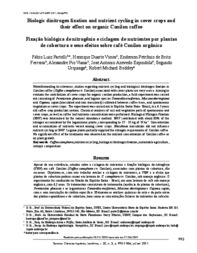Biologic dinitrogen fixation and nutrient cycling in cover crops and their effect on organic Conilon coffee.
Biologic dinitrogen fixation and nutrient cycling in cover crops and their effect on organic Conilon coffee.
Author(s): PARTELLI, F. L.; VIEIRA, H. D.; FERREIRA, E. P. de B.; VIANA, A. P.; ESPINDOLA, J. A. A.; URQUIAGA, S.; BODDEY, R. M.
Summary: Notwithstanding its relevance, studies regarding nutrient cycling and biological dinitrogen fixation in Conilon coffee (Coffee canephora cv. Conilon) associated with cover plants are very scarce. Aiming to evaluate the contribution of cover crops for organic conilon production, a field experiment was carried out consisting of Pennisetum glaucum, and legume species Canavalia ensiformis, Mucuna deeringiana and Cajanus cajan (inoculated and non inoculated) cultivated between coffee trees, and spontaneous vegetation as cover crops. The experiment was carried out in Espírito Santo State- Brazil, in a 6.5 years old coffee crop production system. Chemical analyses of soil and vegetative parts of spontaneous and cover crops, as well as coffee leaf nutrients concentration were performed. Biological Nitrogen Fixation (BNF) was determined by the natural abundance method. BNF contributed with about 80% of the nitrogen accumulated by the leguminous plants, corresponding to 27 - 35 kg of N ha-1. Concentration and accumulation of nutrients varied among cover crops. Rhizobium inoculation did not influence nutrient cycling or BNF. Legume plants partially supplied the nitrogen requirements of Conilon coffee. No significant effect of the treatments was observed on the nutrient concentration of Conilon coffee or on plant growth.
Publication year: 2011
Types of publication: Journal article
Unit: Embrapa Rice & Beans
Observation
Some of Embrapa's publications are published as ePub files. To read them, use or download one of the following free software options to your computer or mobile device. Android: Google Play Books; IOS: iBooks; Windows and Linux: Calibre.
Access other publications
Access the Agricultural Research Database (BDPA) to consult Embrapa's full library collection and records.
Visit Embrapa Bookstore to purchase books and other publications sold by Embrapa.

